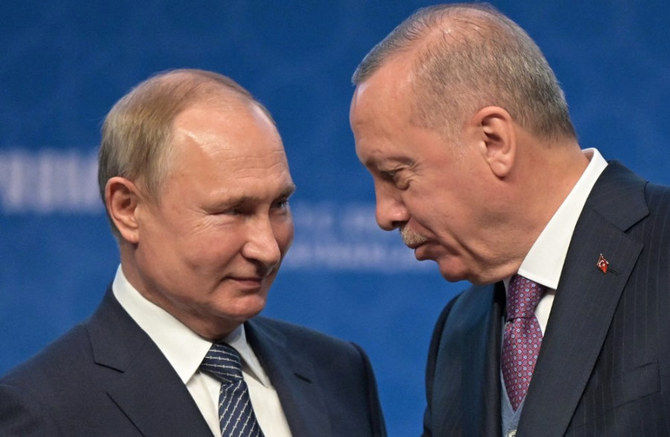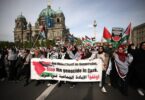Yasar Yakis
A visit by Russian President Vladimir Putin to Turkiye has been pending for a prolonged period. Turkish President Recep Tayyip Erdogan paid a working visit to Sochi at the beginning of September last year. It is now Putin’s turn to visit Turkiye. However, despite several attempts to schedule a trip, the two presidents’ programs did not fit. Putin last month said he was prepared to travel to Turkiye to meet with Erdogan, but the latter’s schedule was tight because of the forthcoming local elections, which will be held on March 31. Putin did not spare any praise for Erdogan’s efforts to contribute to the solution of the Gaza conflict.
The agenda of the intended Erdogan-Putin talks will be full of bilateral questions. Turkiye’s insistent demand to reopen the Black Sea grain corridor is one of them. Following its invasion in February 2022, Russia blockaded Ukrainian ports and made it impossible for Kyiv to export its grain. In July of the same year, Turkiye and the UN brokered a deal establishing safe corridors through the Black Sea. The agreement expired in July 2023, when Moscow refused to agree to an extension.
The construction by Russia of a nuclear power station in Turkiye’s Mediterranean coastal city of Mersin is another important agenda item for the two leaders. It is a power plant owned by Russia on Turkish territory. Construction is progressing more or less according to the schedule. The test stage was completed in April last year. The price Turkiye will pay per kilowatt-hour is high because it was negotiated when the Turkish economy was badly in need of power. Nuclear fuel, which was one of the most important components, has now been delivered to Turkiye. Power generation is expected to begin in October 2024. A second nuclear power plant is scheduled to be constructed in the Turkish Black Sea city of Sinop. Initially, companies from Japan and France were interested in the project, but security standards had to be raised. Now, the Russian company Rosatom is also interested in the project. If an agreement is finalized, it will become a large-scale plant with four power units. This could be another cooperative project between Turkiye and Russia.
As a result of the Ukrainian war, the diversification of energy sources has become an important priority for Turkiye. Pro-Ukraine activists claim that Ankara is indirectly helping Russia to bypass sanctions by buying its oil. But if Turkiye were not to buy this oil, other countries would. Furthermore, Turkiye is supporting Ukraine in many other ways.
As Western countries imposed an oil embargo on Russia following its invasion of Ukraine, Turkiye used this opportunity to buy oil from Russia at a reduced price. In addition, Russia has granted Turkiye a deferral on payment for some of its energy imports. Another important subject in Turkish-Russian relations is the question of the Turkish Straits being used for the transit of British navy ships. The UK and Norway made a deal with Ukraine that would help Kyiv increase its Black Sea security. It included the transfer of two British minehunters to the Ukrainian navy – an agreement that was first announced before war broke out. However, Article 19 of the Montreux Convention authorizes Turkiye to block the passage of warships through the Turkish Straits in the case of war or an imminent threat of war. Therefore, Ankara became squeezed between a rock and a hard place, as the British request put it in a difficult position. If Turkiye were to allow the passage of the ships through the straits, it would antagonize Russia. If it refuses, then Ukraine will be disappointed.
The Montreux Convention also provides that ships belonging to the navy of a Black Sea littoral country that are outside the sea at the moment conflict breaks out are entitled to return to harbor. Turkiye has to decide whether it should allow the minehunters to transit, as it is unclear whether they should be considered as ships that already belong to the Ukrainian navy. There is a tiny gray area. Turkiye has to balance this issue with the utmost care.
The Gaza war is another important subject that Erdogan will definitely raise during the talks with Putin. Turkiye frequently raises this issue in the international arena, but without a tangible effect. Smaller countries such as Qatar play more concrete roles. Russia has not got involved in the Gaza war but, unlike many Western countries, it supports the legitimate rights of the Palestinians. At the beginning of the Ukraine war, many observers thought that it could push Turkiye toward the Euro-Atlantic community and sever Turkish-Russian relations. However, on the contrary, the dynamics of the conflict pushed Ankara and Moscow toward each other and Turkiye played a positive role in mediating between Russia and Ukraine, as well as brokering the grain deal. Turkiye’s airspace has become the major air corridor for Russia to reach many international destinations.
Furthermore, the economic sanctions imposed on Russia by the Euro-Atlantic community have become an important advantage for Ankara. Turkiye and Russia continue to benefit from this advantage. Erdogan and Putin seem eager to meet as soon as possible. If this does not happen before the crucial local elections in Turkiye, it will definitely take place in their immediate aftermath.







